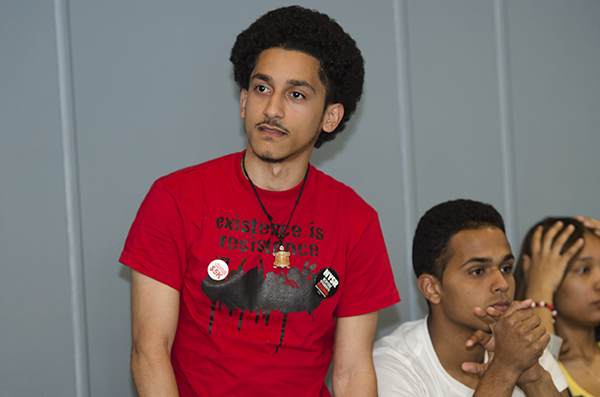
For Jonathan Espinosa, this essay was more than just a well–crafted set of words. This was something close to home.
Drawing inspiration from his brother who was diagnosed with autism when he was 10- months- old, the fourth-year sociology and Black Studies double major spent countless nights researching his final paper for Dr. Karanja Carroll’s Psychology of the Black Child class. What he didn’t know was that soon this paper would be recognized across the nation.
Espinosa’s paper titled “Racial Disparities In Treating And Diagnosing Mental Health Disorders,” was awarded second -place in the National Council of Black Studies Student Essay Contest. The essay explores the cultural reasoning for mental health diagnoses in the United States and the effects they have on the psychological development of children of color.
“I live with a brother who was diagnosed with autism,” Espinosa said. “Having this paper done, I am able to understand more of what is going on and can put it into practice.”
Espinosa said his research allowed him to delve into potential reasons for disparities in not only ways of learning in children of different races, but also cultural trends that might have led to this.
According to his paper’s findings, Espinosa said that in societies of predominantly European descent, most traditional disciplines stem from that culture. However, he said because different cultures have different sets of values in terms of learning –— or the rate at which someone learns –— there are misconceptions in the treatments and diagnoses given to children of color.
“Some people who are really socially awkward could be classified as autistic according to the criteria,” Espinosa said. “But, it’s subjective. It’s a projection of a dominant society that wants to use its own mental health standard and impose it on other people. If you don’t meet that standard, you are considered a problem and diagnosed.”
Espinosa said Black students are more likely to be placed in special education classes and are more likely to be diagnosed with a mental health disorder, according to his findings. He also said this is problematic, as students of color are less likely to receive proper treatment for their disorder.
After writing the essay last semester, Carroll suggested Espinosa submit it for recognition. Then earlier this semester, a surprise landed in Espinosa’s email inbox.
“I submitted it and I really didn’t think I would win, I was just submitting it to do it,” Espinosa said. “Honestly, I forgot about it and in my email one day it said ‘congratulations!’ and I was like, ‘whoa, I completely forgot about that!’”
After being awarded second- place, Espinosa traveled to Indianapolis, Ind., on Friday, March 15, to present the findings of his paper in front of nearly 100 people.
While the time he was allotted was shortened from seven minutes down to three, Espinosa said the experience was still one worth remembering.
“It’s sort of like a trophy. I am a Black Studies major and I earned this. It’s something I can be proud of about my major,” Espinosa said. “A lot of people don’t give Black Studies the credit it deserves, so it shows I have invested my time and energy into my major to the point where I won this national award.”
Moving forward, Espinosa said he hopes to continue writing about issues he is passionate about and that it will hopefully one day culminate in a published work, or even just more knowledge for his ultimate goal of becoming a counselor in the Bronx.
“I have this dream of publishing a book somewhere down the line,” Espinosa said. “I was thinking of compiling all of my major essays in one book, so this essay could be a chapter in that. I want to build off of what I wrote, I want to put it to practice.”

